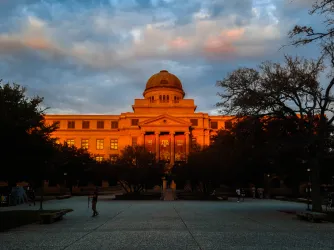Table of Contents
Shake-up at the top: UChicago, Claremont, Purdue all drop in 2024 College Free Speech Rankings

WATCH: The 2024 College Free Speech Rankings are out!
In 2020, the University of Chicago, famous for its staunch support of free speech and for creating the “Chicago Statement,” was the top-ranked school in FIRE’s first ever College Free Speech Rankings. It fell to second overall the next year, then reclaimed the top spot last year.
Purdue University and Claremont McKenna College have a similar positive track-record on free speech. Purdue debuted at sixth overall two years ago, then was ranked third last year. Claremont knocked UChicago out of the top spot in 2021, then was ranked sixth last year.
In this year’s College Free Speech Rankings, however, none of them made the top 10. UChicago did the best of the three, with a very respectable ranking of 13. Purdue also did well, finishing just outside the top 25 with a ranking of 30. Claremont, however, plummeted to a ranking of 73.
Although UChicago and Purdue still did very well in this year’s rankings, and all three schools have a “green light” rating for their speech policies, the drop experienced by these schools is particularly concerning because each has an administration that publicly supports free speech. Unfortunately, all three schools dropped because of administrative actions that violated the speech rights of someone on campus.
University of Chicago
This is the first time the University of Chicago is not one of the top two schools in the College Free Speech Rankings, falling to the still-respectable rank of 13.
All things considered, UChicago still has a lot going for it. As in previous years, it performed very well on the “Administrative Support” component, ranking second overall. Just over half of students (51%) said that it is “very” or “extremely” clear that the administration protects free speech on campus, and 54% said that it is “very” or “extremely” likely that the administration would defend a speaker’s right to express their views during a controversy.
UChicago also performed well on most of the tolerance-related components included in the rankings. It ranked third on “Tolerance for Controversial Liberal Speakers,” and 19 on “Tolerance for Controversial Conservative Speakers.”
UChicago did fall short in a few areas. When it comes to the difference between support for allowing liberal and conservative speakers on campus, it ranked 166, indicating a strong student bias in favor of allowing controversial liberal speakers on campus over conservative ones. It also did not perform well on the “Disruptive Conduct” component, receiving a ranking of 156. This means that students at UChicago, compared to students at more highly ranked schools, were more likely to say that students shouting down a speaker, blocking entry to an event, or using violence to stop a speech are at least “rarely” acceptable.
This, however, is not the reason why UChicago fell in the rankings, as it received similar rankings on these components in previous years.
So, why did it fall out of the top 10?
Because this year’s rankings now factor in how colleges and universities respond to speech controversies on campus that target students and student groups.
This past December, a Turning Point USA chapter applied for official recognition as a registered student organization. The approval committee denied the request because it could not “see a sufficient difference between [TPUSA] and the existing College Republican RSO.” The group appealed the decision, but in January the administration denied the appeal. FIRE wrote UChicago in April explaining that its denial of TPUSA’s application appeared to be viewpoint discriminatory. The university’s reasoning was that TPUSA was too similar to the College Republicans—an explanation that, apart from being clearly based on viewpoint, was a bit like denying a Lutheran group for being too much like the Methodist group. The university disagreed with our letter and stood by the denial, and it was penalized in this year’s rankings for its decision.
Without incurring this penalty, UChicago would have easily retained its elite status in the top 10.
Purdue University
Purdue University, like UChicago, still performed well, ranking 30 out of 248 schools. Still, this represents a notable drop from the previous two years when Purdue ranked sixth (2021-22) and third (2022-23).
Purdue also continued its record of performing well on a number of the survey-based components. Compared to last year, it actually improved its ranking on “Tolerance for Controversial Liberal Speakers” and “Mean Tolerance,” and it performed similarly to last year on “Tolerance for Controversial Conservative Speakers” and “Disruptive Conduct.”
On the other hand, Purdue’s ranking on the “Administrative Support” component dropped from four last year to 37 this year. This coincides with the end of former Indiana Gov. Mitch Daniels’ tenure as university president, suggesting that Daniels, a staunch supporter of speech rights, made students feel confident that his administration would support free speech. This decline in administrative support for free speech, however, is not the primary reason Purdue dropped in the overall rankings.
Rather, Purdue’s drop in the rankings can be attributed in large part to Purdue’s response to calls to sanction one of its students, Maxwell Lawrence. In 2020, Purdue expelled the student for a series of social media posts, including a TikTok video in which Lawrence pretended to run over Black Lives Matter protesters with a vehicle. A Change.org petition with more than 2,500 signatures called on Purdue to punish Lawerence, and the decision to expel him was made by none other than the university’s most prominent supporter of free speech, President Daniels. Other Purdue administrators rightly concluded that Lawrence’s statements were protected speech and that he should not have been expelled.
Purdue was penalized for expelling this student. Without incurring this penalty, it would have easily retained its elite status in the top 10, like UChicago.
Claremont McKenna College
Claremont McKenna, in contrast to UChicago and Purdue, turned in a particularly disappointing performance this year, receiving a ranking of 73. This is a stunning turn of events considering that two years ago, when Claremont was ranked for the first time, it finished first overall, and last year it was ranked sixth.
As in previous years, Claremont did well in the rankings when it came to tolerance for controversial liberal speakers, average tolerance, and administrative support for free speech. It also performed fairly well, again, in its tolerance of conservative speakers, with a ranking of 38, and “Disruptive Conduct,” with a ranking of 54.
Claremont’s decline in this year’s rankings is due to three different incidents that were all added to FIRE’s Scholars Under Fire database after last year’s rankings were released. In each of these incidents, administrators sanctioned a faculty member for the pedagogical decision to quote racial slurs from renowned literature in class.
- In 2021, Claremont placed Professor Chris Nadon under investigation for quoting “Adventures of Huckleberry Finn.”
- In 2022, Claremont advised Professor Robert Faggen to no longer play a recording of the poem, “For the Union Dead.”
- Also in 2022, Claremont chose not to renew Professor Eva Revesz’s contract after she cited passages from “The Color Purple.”
Claremont may disagree, but FIRE considers each of these incidents a violation of academic freedom rights. Accordingly, the school was penalized for each one in this year’s rankings.
Without these penalties Claremont, like UChicago and Purdue, would also have easily retained its elite status in the top 10.
Administrative behavior matters
All three of these schools are well-known for their staunch support for free expression. This support is commendable and is reflected in their individual “Administrative Support” rankings and in their “green light” rating for their speech policies.
But a “green light” rating does not by itself guarantee that a school actively supports free speech. And student perceptions of an administration’s support for free speech on campus are just that — perceptions, which are subject to their own idiosyncrasies, and could change quickly year-to-year simply due to the turnover in undergraduate students.
All three of these schools would still rank in the top ten of the College Free Speech Rankings if they had chosen to defend a person’s speech rights in the face of controversy.
In other words, publicly stating that free speech is the core value of a school — something that likely contributes to a strong score on “Administrative Support” — and writing good speech policies are only the beginning of creating an environment of open and robust conversation. The proof of whether a school truly supports free expression as a core value comes when that core value is inevitably tested by controversy.
Thus, the decisions administrators make in response to campus speech controversies are likely to have a more lasting influence on an individual school’s climate for free expression than its policies or its students’ perceptions of “Administrative Support.” When a decision is made unequivocally in defense of free speech it sends one kind of message to a school’s students and faculty. When a response is tepid or, worse, one that violates someone’s speech rights, it sends a very different kind of message.
All three of these schools would still rank in the top ten of the College Free Speech Rankings if they had chosen to defend a person’s speech rights in the face of controversy. Instead, they did not live up to their stated principles in these instances and their stated principles and gave into demands from others to sanction an individual for expression. These decisions have consequences, and you see that reflected in this year’s rankings.
As always, FIRE is ready and willing to work with these and all universities to improve the climate of free speech on each of their respective campuses.
Recent Articles
Get the latest free speech news and analysis from FIRE.

The American people fact-checked their government

Facing mass protests, Iran relies on familiar tools of state violence and internet blackouts

Unsealed records reveal officials targeted Khalil, Ozturk, Mahdawi solely for protected speech





